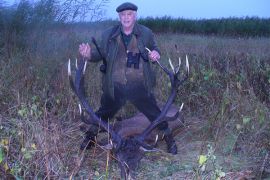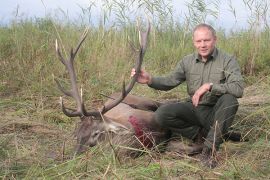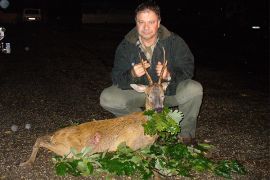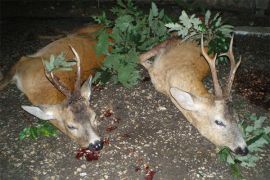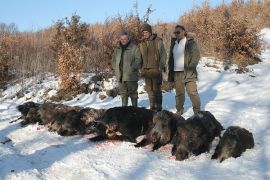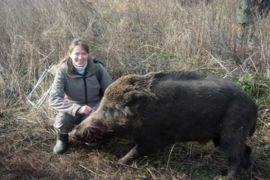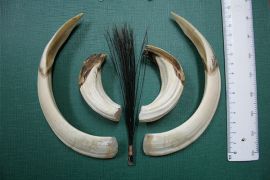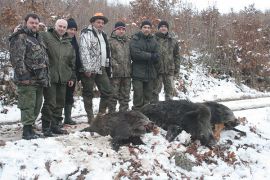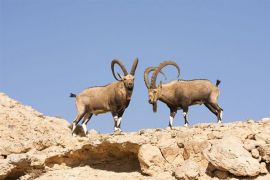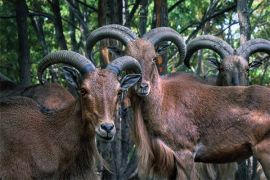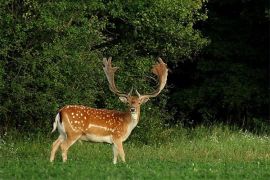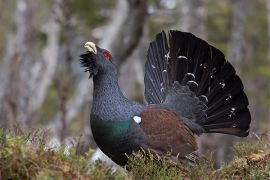Организираният ловен туризъм започва в началото на 60-те години на ХХ век. За любителите на лова и риболова има изградени около 110 ловни резиденции, хижи, домове и заслони, които предлагат подслон. Както ловното, така
и рибното богатство е голямо и разнообразно в България (за район Мичковци 5343).
Ловът по своята същност се явява една от дейностите практикувани от древни времена, постепенно се превръща в хоби, любим спорт, в един от видовете алтернативен туризъм широко практикуван и популярен днес. Мотивите за практикуване на ловен
туризъм са разнообразни: спортна (ловна) страст, придобиване на ловни трофеи, консумиране на дивечово месо, контакт с природата, участие в емоционално преживяване и т.н. Близки до ловния туризъм са спортният риболов и сафаритуризма.
За запазване на генофонда на благородния елен, глухара, дивата коза и колхидския фазан са обособени в дивечовъдни станции, които се грижат за запазването и обогатяването на видовото разнообразие, разселване и възпроизводство на дивеча.
Риболовният туризъм е може би най-практикувания в света. За милиони хора по света риболовът е хоби и спорт. Той е най-добрият лек срещу стреса. Страната ни има много изградени курортни кътчета, предлагащи риболовен туризъм.
Всяка година се произвеждат и разселват около 500 000 рибки за зарибяване на водоемите за спортен риболов. По-голяма част от лесничействата предлагат възможности за риболов на сладководни видове като: шаран, сом, пъстърва, бяла риба,
клен, сом, костур и други. В Черно море се ловят: калкан, лаврак, лафер, морски кефал, моруна и други.
Ареал - територия, заета от пополацията на даден биологически вид или таксон.
Биогеографско райониране - разпределение на биологичните видове по географски райони, зони и пояси.
Биогеоценоза - сложна дума, съставена от корените био- живот, гео-земя, ценоза- съобщество. Екологически термин от руски произход, който означава съвкупност от съобщества от растителен или животински произход и условията
за тяхното съществуване. По смисъл този термин е равнозначен на екосистема, но с по-ясно определени граници.
Биотоп - сложна дума, съставена от био-живот и топ - съвкупност от екологичните условия необходими за съществуването на даден вид.
Виброс-мустаци - специални, анатомични приспособления със силно развити нервни окончания, за улавяне на слаби шумове или трептения.
Волиер - заградено място за отглеждане на птици, в което те могат да летят и условията за живот максимално се приближават до природните.
Възрастов полиморфизъм - морфологически или анатомически изменения, свързани с възрастта на даден биологичен вид.
Годинаци - едногодишни ловни животни
Генотип - генните заложби на даден индивид, които се проявяват при определени условия.
Дендрариум - сбирка от дървесни и храстови видове засадени върху една площ.
Екстериорни качества или белези - външни качества или белези.
Ендемит - биологичен вид, срещан само при точно определени условия.
Епизотии - масово проявление на заболявания по животните, имащи паразитен характер
Еструс - разгонване на женско животно - първата фаза на еструс цикъла, през който може да стане оплождане - трае средно седем-девет дни
Еуробионти - силно екологическа пластични биологически видове, заемащи обширни екологически ареали.
Закелевяла растителност - силно изостанала по различни причини - непрекъсната повреда от дивеч или домашни животни, суша, пожар, антропогенно замърсяване, в своето развитие.
Зоогеографско райониране - райониране на животинските видове по географско райони, зони и пояси.
Интродукция - въвеждане, внасяне. В смисъла внасяне в природата на нов за съответните условия ловен вид.
Квотен принцип - Съгласно Закона за биоразнообразието, при застрашените от изчезване видове дивеч, на базата на ловната таксация, в зависимост от плътността и чеслеността на популацията им се определя количеството индивиди,
които могат да бъдат отстреляни. Разрешение за това се дава от РИОСВ, ДГС и ДЛС.
Кинология - наука, занимаваща се с биологията, систематиката, отглеждането и обучението на кучетата.
Клинална географска изменчивост - склонност на даден ловен вид или раса от него да заема специфични местообитания, например поречията на реките.
Латентна фаза - силно забавено развитие, силно редуцирана обмяна на веществата и енергията в животинското тяло. Състояние на дълбок биологичен покой.
Линеене - смяна на окосмяването или перата при животните или птиците.
Ловна таксация - преброяване на ловните запаси в дадена територия.
Миграция - преместване, придвижване на даден ловен или друг животински вид от едно място на друго.
Морфологични белези - външни анатомични белези на даден растителен или животински вид, които съществено го отделят в систематично отношение от другите видове.
Огледало - термин за означаване на бялото петно, което се намира около опашката на някои видове като сърни и елени.
Опресняване на кръвта - метод на отглеждане на дивеча и обновяване на неговия генотип, при който в даден район се внасят ловни видове от отделечени на местните видове популации. Цели се осигуряване на отдалечено родствено
размножаване и избягване деградацията на трофейната структура на дивеча.
Орнитология - част от научното познание или наука, която изучава птиците.
Орнитолог - човек, който се занимава с изучаване на птиците.
Полов диморфизъм - силно изразени морфологически и анатомически различия между мъжките и женските индивиди на даден вид.
Регресия - намаляване, влошаване.
Рило - предната заострена част на муцуната на дивата свиня или язовеца.
Розетка - рогови образувания във вид на правилен или неправилен кръг около основата на рогата при сърните, елените и други видове. Размерът на розетката, броят на израстъците (перлите) и тяхната дължина са елементи
на оценката на трофеите.
Сезонен диморфизъм - силно изразени морфологически и анатомически различия между мъжките и женските индивиди на даден вид по време на годишните сезони.
Стенобионти - биологични видове, приспособени да живеят при точно определени екологични условия със силно стеснени параметри. Това са също видове, заемащи тесни екологически ниши с малък ареал на разпространиние.
Таксация - преброяване, пресмятане на дадени биотични агенти. Метод за изследване в горите и ловното стопанство.
Токовища - местата, където се събират петлите при глухарите по време на борбите през брачния период.
Токуване - ритуалните игри и звуци, издавани от петлите при глухарите по време на любовните игри.
Трахиноскопия - ветеринарно-медицинско изследване за наличие на трахенелоза, мускулни паразити по месото на дивата свиня или мечката
Хибрид - индивиди, получени от кръстостването на два растителни или животински вида.
Холка - морфологически термин за означаване на мястото, където предните плешки на животните се събират. Разстоянието от земята до холката (височината на животното) е важен морфологичен белег за отделните видове
или породи от един и същи вид.
Фенотип - външните проявления на генотипа
Фитогеографско райониране - райониране на растителните видове по географско райони, зони и пояси.
Правила за лов на едър дивеч
Ловът на едър дивеч е изключително отговорна задача и изисква много познания и умения от страна на водача, а така също и на ловеца. Отглеждането на един екземпляр с добър трофей изисква много грижи от страна на дивечовъда, а при един неуспешен
изстрел животното може да бъде изгубено и трофеят унищожен. Ловът трябва да бъде подчинен не само на икономическата, но и преди всичко на грижата за опазване на екологичното равновесие, като развъдно мероприятие не само за добив на
месо, но преди всичко за подобряване качеството на дивеча и неговите трофеи.
Биологичните особености на благородния елен, елена лопатар, дивата котка, сърната, мечката и глухарът, които са свързани с добива на качествени трофеи в международния ловен туризъм, налагат ловът им да се провежда само индивидуално. Поради
ограничените налични запаси от диви кози, мечки и глухар, са нужни специални разрешителни за отстрелването им (квота за отстрел и износ). Ловът на диви свине и сърни освен индивидуално, се провежда и групово, съответно на
гонки с помощта на специално обучени кучета за лов на диви свине. А що се отнася до сърните тази практика е нужно да се ограничава.
Начините за ловуване на едър дивеч зависят от вида му, от състоянието на неговите запаси, от конфигурацията на терена, от периода, през който ще се ловува и т.н.
За лов на едър дивеч се използват ловни карабини, снабдени с оптичен мерник или гладкоцевни ловни пушки с допълнителна цев за куршум или за по-къси разстояния с бренеке.
Видове лов на едър дивеч
В ловната практика за отстрел на едър дивеч обикновено се прилагат следните начини за ловуване, които са дадени по-долу, без да се спираме подробно на тяхното описание.
- Лов чрез издебване - прилага се също за извършване на подробен отстрел при селекционен лов. Когато животното е само, възможно е то да бъде приближено, но когато са повече екземпляра те побягват при най-слаб шум.
- Лов чрез причакване - най-често на чакача - използва се при селекционен отстрел. Това е съвременен метод и се практикува във всички ловни стопанства - отстрелват се предимно малоценни, некачествени и дегенерирали екземпляри, които
дават хилаво поколение и от които не може да се очакват добри трофеи.
- Лов чрез спокойно вдигане - един или двама ловци и толкава гоначи приближават мястото, където се намира дивеча и той естествено се вдига. Този начин изисква добро познаване на навиците на ловните животни и отлична подготовка на ловците
и гоначите.
- Лов с помощта на ловни кучета - разрешен е при лова на диви свине.
Познати са и други начини за лов на едър дивеч, но те представляват само модификация на вече споменатите.
Ловни ритуали
По стара традиция ритуалите по време на лов засвидетелстват уважението и преклонението на ловците пред величието и щедростта на природата и нейното дивечово богатство. Те са установените норми и правила, които правят облика на ловеца хуманен
и благороден, ето защо е важно да се знаят и спазват. Трябва да се има предвид, че западните ловци държат изключително много на това.
През м. януари 2006 г. със заповед на Националното управление на горите бе сформирана работна група, която да създаде проект за "Указания относно провеждането на ловните ритуали, съобразно вида дивеч и начина на ловуване". Като база за
работа по този проект са приети ловните ритуали, описани в Инструкцията за провеждане на ловен туризъм в България, които до голяма степен се покриват с практикуваните в Европа
Ритуали при лов на едър дивеч
В часа на излизането, ловният водач (при индивидуален лов или ръководителят на лова с придружителите (при колективен лов), строени пред превозните средства посрещат госта (гостите) с поздрав "НАСЛУКА!"
При успешен лов отстреляният дивеч се украсява с клонки по този начин се дава израз на благоговението и уважението на ловеца спрямо дивеча, а чрез връчване на клонче на самия ловец се изразява радостта от проявеното ловно майсторство.
Клонките се отчупват с ръка и са от следните дървесни видове: ела, смърч, бор, клек, дъб, бук и елша.
Видове украси и клонки, правила за прилагането им:
- Клонка за притежание на отстреляния дивеч.
- Клонката да бъде на дължина един лакът. Полага се по дължина на простряното, обърнато на дясната страна тяло на дивеча: елен, сърна, дива коза, дива свиня и муфлон. Тя е символ и израз на уважение и последен поздрав от ловеца към отстреляното
животно и получаване право на притежанието му. Поставянето на клонката се извършва от ловеца. Отчупеният край на клонката, при мъжките екземпляри, трябва да е насочен към главата, а при женските обратно.
- Клонка "последна хапка"
- Само в устата на мъжките екземпляри от: елен, сърна, дива коза, дива свиня, муфлон, както и глухар се поставя напреко в устата по едно малко клонче. Поставя се от водача. Преди това ловецът прекарва няколко минути сам в съзерцание,
размишлява и преживява моментите от лова. Това е т. нар. "почетна стража".
- В ловната хижа добитият трофей се поставя на видно място на масата, като се украсява с много зеленина. Със зеленина се украсява и мястото на ловеца. Тогава се дава "прощална почерпка" и на ловеца се пожелават нови ловни успехи.
- Стрелково клонче
- Поднася се на ловеца, отстрелял екземпляр от: елен, сърна, дива коза, дива свиня, муфлон, глухар, лисица.
- При индивидуален лов се поднася от водача, а при колективен - от ръководителя на лова или директора на държавната дивечовъдна станция (държавното лесничейство). Поднася се поставено върху ловен нож или върху снета шапка, а поднасящият
поздравява: "ЗА ЛОВНИЯ УСПЕХ!" Когато намирането на отстреляния дивеч става с куче с водач, ловецът откъсва парче от клончето и го връчва на водача на кучето. Последният закичва гердана на кучето.
Заключително подреждане на отстреляния дивеч
След приключване на лова отделните екземпляри се полагат на земята върху дясната си страна, украсени със съответните клонки. За добра видимост на трофеите, мъжките се подпират с колчета. В първата редица се поставят елени и кошути, във
втората лопатари, а след това - дивите свине, сърните, муфлоните и последни - лисиците. Най-големите трофеи се поставят начело, а женските екземпляри се подреждат според големината на тялото. Абсолютно забранено и недопустимо е прекрачването
на редиците и наместването на отделните екземпляри с крак!
Заключително подреждане на отстреляния дивеч
Заключителни ритуали след лова.
Ръководителят на лова или директорът на държавната дивечовъдна станция (държавното лесничейство) и ловците се нареждат пред подредения в редици дивеч. Между тях и дивеча застават тръбачите с ловни рогове (ако има такива).
От другите две страни на дивеча предварително се поставят клади от дърва, които се запалват по време на поздравителния ритуал. След подреждането, директорът на държавната дивечовъдна станция (държавното лесничейство) или ръководителят
на лова излиза няколко крачки напред, поздравява участниците в лова, поднася стрелковите клончета на ловците и дава нареждане да се свири ОТБОЙ - КРАЙ НА ЛОВА. Сигналите "ЛОВЕН ОТБОЙ" се дават по следния ред: "убит елен", "убит лопатар",
"убит глиган" и т.н., поотделно за всички видове дивеч, отстрелян през излета (там, където има възможност). На ловеца, отстрелял най-голямо количество дивеч се връчва сувенир и диплома и се закичва със зелен венец.
Ритуали при лов на дребен дивеч
При лова на дребния дивеч се спазват същите ритуали като при колективния лов на едър дивеч. Разликата е в заключителното подреждане на дивеча. Отстрелваните екземпляри се полагат в следния ред: лисици, зайци, фазани, яребици и др. Ако
от даден вид са отстреляни малко бройки, редът се продължава с друг вид дивеч. За по-голяма тържественост при лова на дребен дивеч се палят клади и се свири "ЛОВЕН ОТБОЙ", но еднократно. И при този лов се отличава най-добрият ловец
като "ловен крал" - на база най-голямо количество отстрелян дивеч, също се връчва сувенир.



